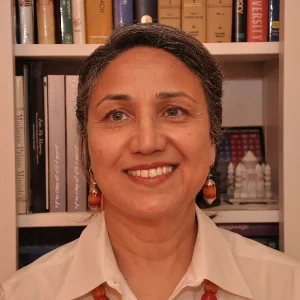Dr. Farhana Shah is a faculty member with the Johns Hopkins Engineering for Professionals program. She received her M.Sc. degree in Mathematics from the University of Peshawar, an M.S. in Computer Science from Northeastern University in Boston, and a Ph.D. in Computer Science from Illinois Institute of Technology in Chicago. Dr. Shah specialized in Artificial Intelligence and conducted research on a language-based intelligent tutoring system. She has significant teaching experience at Quaid-i-Azam University in Pakistan, Loyola University in Chicago, the University of the District of Columbia, and the Defense Language Institute. She also volunteers at the Library of Congress and is a mentor for the Women in Public Sector Project at the Woodrow Wilson Center.
Education History
- M.S., Math concentration Computer Science, Northeastern University
- Ph.D., Computer Science, Illinois Institute of Technology
Work Experience
Instructor, JHU Whiting School of Engineering
Publications
Farhana Shah and Martha Evens. (2008) “Emotions in a Corpus of Human and Computer Keyboard-to-Keyboard Tutoring Sessions.” Proceedings of Sixth International Conference on Language Resources and Evaluation (ELRA 2008), Marrakech, Morocco, May 26-June 1. 48-53.
Farhana Shah and Martha Evens. (2007). “Spoken vs Typed Tutoring: A Comparative Study of Communication Features.” Proceedings of the Eighteenth Midwest Conference on Artificial Intelligence and Cognitive Science (MAICS 2007), Chicago, IL, April 21-22. 37-43.
Farhana Shah. (2004). “An Analysis of Tutor-Responses to Student-Initiatives in Keyboard-to-Keyboard Tutorial Sessions.” Quarterly Journal of Science, Technology and Development. Islamabad, Pakistan. October-December 2004, Vol. 23, Number 4. 7-10.
Farhana Shah, Martha W. Evens, Joel A. Michael, and Allen A. Rovick. (2002). “Classifying Student Initiatives and Tutor Responses in Human Keyboard-to- Keyboard Tutoring Sessions.” Discourse Processes. Vol 33. Number 1. 23-52.
Farhana Shah and Martha Evens. (1997). “Student Initiatives and Tutor Responses in a Medical Tutoring System.” Technical Report of the AAAI Spring Symposium on Computational Models for Mixed Initiative Interaction. Stanford University, CA, March 24-26. 138-144.
Farhana Shah and Martha Evens. (1996). “How to Respond to Student Initiatives in Tutoring Systems.” Proceedings of the Midwest Artificial Intelligence and Cognitive Science (MAICS96).
Farhana Shah, Mariana Hentea, and Martha Evens. (1995). “Hybrid Connectionist Quality Management in Steel Manufacturing.” Proceedings of the World Congress on Neural Networks. Washington, DC, July 1995. Vol 2. 74-79.
Courses
Data Structures
605.202
|
|
